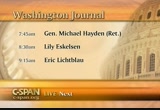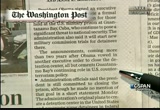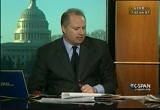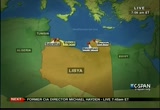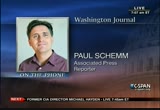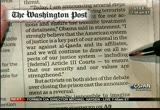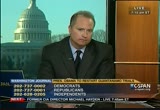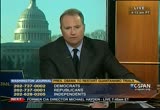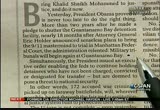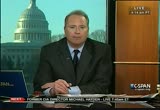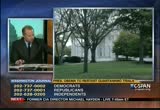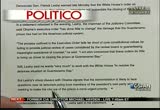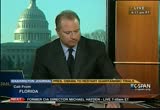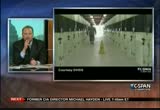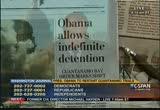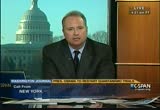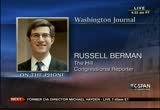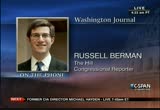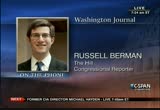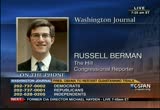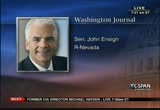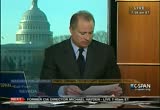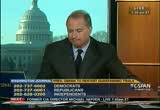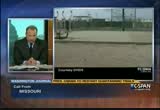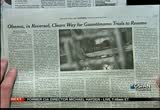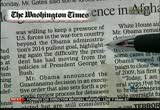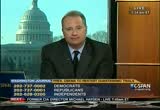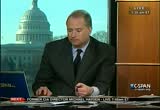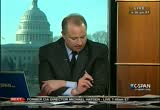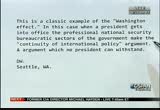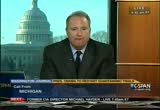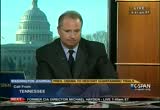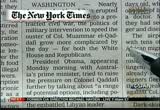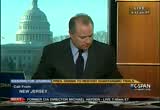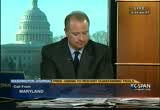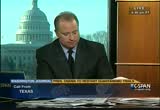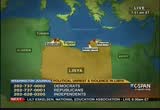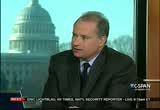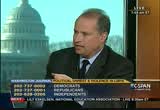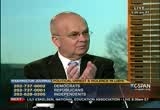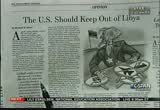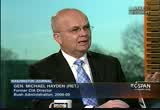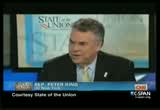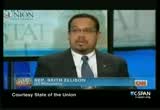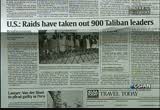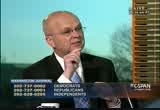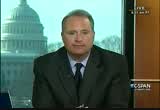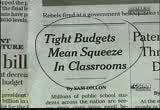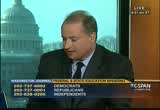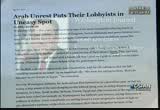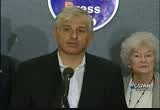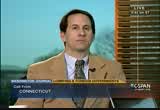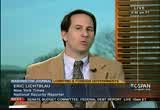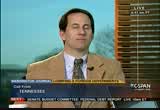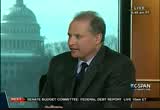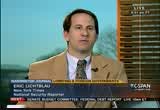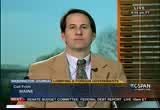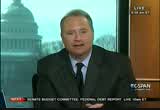tv Washington Journal CSPAN March 8, 2011 7:00am-10:00am EST
7:00 am
situation in libya and get perspective on the middle east. eskelsen on the current budget situations in states. and then theric lichtblau will join us. host: lots of reaction coming in from capitol hill and elsewhere to the president's executive order. the headline say obama to allow indefinite detention at guantanamo bay. the u.s. plans to resume trial by military commission. want to get your reaction to the news. here are the numbers to call.
7:02 am
we will read more from the headlines here and take your calls. a lot of reaction in the paper to the of guantanamo bay decision, but we will spend a couple of minutes on the phone first to get some new information, if we can come on the situation in libya. a reporterl soschem, from "the associated press." the new headline suggests that muammar gaddafi is looking for some sort of deal. is that correct or just p.r. from the other side, if you can call it that? guest: it is hard to say. what we're hearing is second- hand reports. apparently, according to the era of new stations, there have been offers to begin negotiations of some kind. apparently one of the conditions is that the rebels would lay
7:03 am
down their arms and the negotiations would begin. in the past, the national transition council, which has been running the side of the country has said they will not negotiate. it is difficult to see how far this initiative will go. we have currently reached role in this situation -- a lull in the situation. host: what else are you hearing and seeing today, and what can you say about some many of the reports that say each side is digging in and cannot overwhelmingly to defeat the other? this could be a while. guest: that does not seem to be what they're trying to do at this point. everyone i have talked to said they are regrouping and bringing out the heavy weapons. up until this point it has been
7:04 am
about the freelance volunteer units. it has worked against the lightly-defended oil towns, but now they have reached the government line. two days ago they came up a steady barrage of 10 fire and artillery. that pretty much stopped their advance cold. what we can see now is officers of the rebels' military trying to bring order to this chaotic the end of fighters. they are making sure the ammunition is delivered and they're trying to bring up the heavy resistance. at this point they are regrouping, but i do not really expect them to really dig in. the government appears to be digging in. they have made no effort to events, because it does not
7:05 am
appear there is a major rebel force against them. the rebels have indicated they plan, as soon as they can get their fortress together, to keep advancing. host: some of the video we have been looking at is al jeezera. a libyan state tv is denying that they have sought a deal with rebel spirit and we are seeing this headline in "usa today" as well. take us through the possibility of any air support through the u.s. or any other country. what are folks anticipating? guest: the issue is quite sensitive. one of these actually hit in a residential neighborhood, not
7:06 am
far from where i was. yesterday there was one quite close to me. it is quite ineffective. [inaudible] they open up with the anti- aircraft guns, but the planes are flying incredibly high. there is a feeling among the rebel government that a no-fly zone would go a long way to helping them out, but i understand something like that could be far in the future. what stopped the rebel advance was massive artillery and tank fire. host: what are you looking for today in the days ahead to tell you which way this thing might be going? guest: can they get the heavy weapons out and break the
7:07 am
defensive line? several rebels have said they anticipate an offensive today, maybe tomorrow. these could just be reversed. if the libyan government decides to go forward, that could be quite decisive as well. even if the rebels to not break through and the next couple of days, i think you will see a stalemate of a country divided between east and west, which would not be good for either side. host: paul schemm joining us live from libya. thank you for your time and updates. we will get to your calls in just a second. about guantanamo bay, cuba. this executive order marks a policy shift. the u.s. also plans to resume trials by military commission. here is what the president wrote
7:08 am
7:09 am
i think that is the big problem. not obama's fault. caller: first of all, these are not criminals, these are terrorists. it was always a stupid idea to give these animals the same rights that the american citizen or ordinary criminal has. he has finally awakened to the world of reality on this subject. host: 2 district heights, md.. john on the democratic line. how about your reaction this morning. caller: it is unbelievable. i cannot hear the stupidity i am hearing. the only thing that separates us from the rest of the world is our system of justice. we call ourselves a country that wants democracy and democracy is
7:10 am
fair justice under law. you are innocent until proven guilty no matter where you are or what you are approved with. we're going back to the 17th century were england, france, and spain would lock you up. rome and greece did the same thing. lock you up and give you a bogus trial. you are guilty based upon the state, not because of the evidence. i do not understand how the american people can look at this and say we are supposed to be a nation of laws. this is a travesty. if i was a muslim or arab, i would trust nothing that hillary clinton says, none of them. this is what gives us a light on the hill, our system of justice. i do not understand why people cannot understand that. host: drawn from maryland.
7:11 am
7:12 am
these people are terrorists and murderers. they have made up their mind. how many have we let go to recapture them on the battlefield? i was booked on weapons possession. i did win in court. i had people coming to me in jail asking about weapons when they found out i was incarcerated for weapons. this just kept happening one after another. it is just ridiculous. it is something that is so out of hand. [inaudible] there is a problem here that is not easy to address. people do not even know what is going on.
7:13 am
7:14 am
administration does not have a clue. he is the most indecisive leader we have ever had. as far as guantanamo bay, i am old fashioned. if you tried to kill me, i will kill you first. we should give them a trial immediately b. maybe we should give them up pamphlet and let them vote democrat and we can all sing as this country goes to hell. host: what you make of the news that obama will start guantanamo trials? caller: i haven't tried to expose the lost angeles county judges since 1997. he was imprisoned. he expose that there are thousands of people falsely
7:15 am
imprisoned in lost angeles county jail without even a document number. imprisoned people already exist in this country and they are american citizens. this judicial corruption is not specific to loss angeles, it is spread across the country. we are not treating them any different. our justice system is broke. eric holder should be indefinitely in prisons until the situation is straight out. it is not just guantanamo, it is our civil and criminal courts are out of control. there is no justice in america anymore, and we need to fix it now. host: here is reaction from chairman of the senate judiciary committee. he fears it will stay open. he warned late last night that the white house order on renewing the commission's will jeopardize the closing of the prison that president obama has
7:16 am
promised to shut. he said the executive order has done little to change the damage that the guantanamo prison has had on the american judicial system. you could read more about politico. the top republican on the committee said the order is in the right direction as opposed to the liver of questionable decisions at the white house by guantanamo. luther, a democrat. what are your thoughts? caller: you have a new
7:17 am
president, young president tried to do the right thing. there is going to be times he is going to say things because he does not know all of the facts. once he'd knows the facts, he has to do it to around. -- once he knows the facts, he has to do a turnaround. he is trying to turn the country around. he is going to make mistakes, but he did not walk into a palace, he walked into a disaster. he is trying to straighten it out. i think americans need to give him a chance to get the job done. he walked into the stock market crash and unemployment. everything he walked into was a disaster. it will take time to get the country back together.
7:18 am
there is an opportunity to clean things up i just think as americans we should support what the president does. host: that was luther in florida. chicago, republican line. good morning, val. are you there? caller: yes, i am. host: go ahead. please turn the sound down on your set so we do not get any feedback. caller: i do not know why president obama does not recognize terrorist for what it is. host: do you want to go on? magnolia, mississippi, on the line. cook, go ahead on the democrat line. caller: i want to know who said
7:19 am
those people are terrorists? did anybody see them do anything wrong? or are you going by what somebody said? there is something funny about the whole thing. they could have called them in off the street and lock them in and said they were terrorists. host: got the point. appreciate your call this morning. we will do this for about 25 more minutes. we you are talking about the executive order. obama allows indefinite detention. it marks a big shift as most folks are suggesting. the u.s. also plans to resume trials by military commissions. we're getting your reaction to this. they say obama ratifies bush. that is the way write it.
7:20 am
germantown, new york. ed, republican. go ahead. caller: i think he is a leftist ideologist. he has not changed his mind. he is positioning himself for 2012. there will be other decisions like this that make it seem like he is going towards the center for making peace with the people on opposite side, but it will not happen. on the till as much
7:21 am
left as he ever was. host: are you suggesting this is all a political move for the election? caller: yes. if he really felt that way, he would have done something a while ago. he sees some of the challenge from the right, and he has to do this to get ready for 2012. that is all. he wants to stay in power, and he must do things like this to try to get both sides of the ideal. -- both sides of the aisle. host: we will get back to your phone calls in just a minute. we want to get the big headlines from russell perlmberman. we understand the senate is supposed to take a couple of big
7:22 am
boats today. guest: harry reid said yesterday there would be two test boats as early as this afternoon of the spending plans. one would be on the house republican bill that would cut $57 billion from current spending months of the year. -- harry reid said yesterday there would be to test votes as early as this afternoon on the spending plans. so both bills are expected to fail, but it is expected to give people on both sides an idea of where the support lies and the fact that they will have to come to the table and compromise. host: so the government
7:23 am
operating on a temporary bill again, which expires a week from friday. when will they get seriously back of the table again, and where are the new lines being drawn? guest: they had an initial meeting last thursday with a vice president. he is now oversees in finland and russia through the end of the week, so those are little bit on hold, at least of the high level. what you will see after this vote is they will start to say we realize we need to compromise, and i think most of the negotiations will take place behind closed doors. host: what hearing should we be looking out for mostly this week? what are you tracking that will have the biggest impact here in
7:24 am
town? guest: there are a ton of budget hearings on the president's budget, but the one getting the most attention is a hearing scheduled for thursday on the house homeland security committee chaired by peter king of new york. this one is looking into the radicalization of muslims in america, and this has been a highly-charged issue. there have been a lot of critics of peter king saying it is borderline on a witch hunt and counterproductive to the u.s. goal of counter-terrorism. he said we have a couple of incidents of homegrown terrorism and it is a legitimate issue to investigate in the house. host: that is a hearing we will have live on c-span 3 on thursday. the topic at hand, we have been
7:25 am
asking callers about the reaction to the president's order on guantanamo bay. expecting anything big today in terms of reaction to this order? guest: i would expect a reaction along the lines we have seen. this is been an issue where the president would acknowledge that he stumbled to fulfill the promise of guantanamo bay, and this is just another acknowledgement that they have not been able to do it. the issue in congress is that even when there was a democratic majority in the house, they passed bills to restrict funding for closing the prison space, and more specifically moving the detainees there on to u.s. soil. so with the republicans in control now, i am sure they realize that would be even more
7:26 am
difficult. this is just about reality in this circumstance and acknowledge in they have to move on with some sort of a way of trying people who are there. and you will see that liberals will say this is very disappointing and a further break of his campaign promise and republicans are probably going to say good to see the president has come around to what we've been arguing for the past couple of years, that some of the policies that president bush put in place are not as bad as democrats have argued and are youe difficult to ende than heard on the campaign trail couple of years ago. host: before we let you go, your publication is reporting on the announcements, the retirement
7:27 am
announcement of john hanson, a republican from nevada. how did this come about? guest: the conventional wisdom here is it is good for republicans. he was caught by his scandal of acknowledge affair with his member of staff and paying money and finding a job for the husband of the woman. he was already running behind in polls to a republican in nevada who was going to give him a primary challenge. this is seen as good news for republicans. it will still be a very close race or expected to be a close race, because nevada has been a democrat-leaning states in the past couple of years. host: thank you for your time on
7:28 am
the many stories out there today. back to your calls on this story. "the baltimore sun" headline -- photograph dating back to 2009. a detainee is standing at an interior fence at the prison, which holds about 170 inmates. caller: what happened to the constitution? isn't there laws that says you ever write to trial? -- that you have a right to trial? host: next call. caller: i believe anybody deserves a fair trial. you take it when you have the actual facts and figures and you
7:29 am
have a fair trial for the person. it should not matter to the american public what the crime was. we have domestic terrorists all of the time, they have a fair trial. host: what parameters to put on a fair trial? -- do you put on a fair trial? caller: i understand these terrorists have been in the judicial system for a long time and try to cut down on budget, but in all reality we need to make sure -- these are big allegations on these guys. we need to make sure every fact in figure is right. i do not want somebody saying they did this and they did that without us actually looking at all of the facts. host: let's hear from bill in st. louis on the line for
7:30 am
democrats. your reaction. caller: one of the reasons i voted for president obama as president is he was going to close guantanamo. he has done nothing he said he would since he got in office. i would of thought he would have gone after the real terrorists in our government, bush and his gang. how many iraqis killed americans on 9/11? not one. him and holder have not done anything to go after george bush and dick cheney for what they have done? i thought he was going after osama bin laden for what he did. i would have water board of this man 1 million times. he would have confessed to being
7:31 am
jesus christ if we would ask him. host: bill from st. louis. here is one tweet this morning -- host: here is the headline in " the new york times" -- times" puts it right on the front page. they link aid to afghanistan overall. -- they link it to afghanistan overall. they have a headline to another story that says gates suggest presence inpreseoop
7:32 am
7:33 am
they do not say what their corn to do -- they do not do what they said they are going to do. host: cincinnati, deborah. democrat. caller: good morning. i think anybody at this point who still thinks obama is a liberal really needs to rethink that. this is coming from a former obama fan girl. we started out with him saying he was going to close guantanamo. now he is saying we can keep them indefinitely. he has backed wiretapping. he has not said much about the patriot act. partiers whoo-partea
7:34 am
said the pitcher act was closed. he is not a liberal. he is just not. i am very disappointed with president obama. host: we go to madison, wisconsin. course is waiting to -- horace is waiting to comment. turn your son down, please. please. down, can you turn the sound down? hold going to put you on and asked you to turn the sound down completely. we will try to get back to you if we can. washington, d.c.. caller: good morning, everybody.
7:35 am
i think the gentleman earlier had very good points. we need to find out the group of people who decide who is a terrorist. it comes out like self righteousness. we as americans have not seen the worst of things here. we had to? clans. -- we had ku klux clans. we need to know who those people are, because they might be your greatest terrorist. host: ok. st. joseph, missouri. julie on the line for republicans. thank you for waiting and calling. caller: i just want to say i am glad these guys are finally going to be tried in the military tribunals.
7:36 am
they are not american citizens. they should not get any kind of constitutional rights that our country has, and furthermore, they are enemy combatants who murdered over 3000 people in our country and destroyed new york. i do not get where the left thinks they should get a fair trial here in our country at the expense of millions of dollars of taxpayer dollars? host: more reaction from the hill. california republican, i hear is "the washington times." he said this -- there is more from the national
7:37 am
security program criticizing the decision. exeter, new hampshire. the incumbent democrat. good morning. -- dan, democrat. caller: just like the last lady who called who said they did not deserve rights, the supreme court has already said they do. the biggest the clerk for the guantanamo question is the torture question. federal courts will not allow testimony in court from torture. the military tribunals do. this is the problem created when you operate outside of the law as the bush administration did and let the big mess for his predecessor to clean up. thank you. host: carried from -- terry from
7:38 am
raleigh, north carolina. what is your reaction? caller: my reaction is basically like this. i think we should give president obama a break, because he is doing the best he can. he has to go through other people before he can do anything. he has to clean up the mess before he can get anything started in his cabinet. he has to actually go and work on the health care bills, and not only health care, but the other things going on in the country, and he is only one person. if nobody will work with him, he will have the problems i think everyone should support him the way they were when he was getting elected. and host: appreciate your call. another tweet this morning.
7:39 am
7:40 am
i was sworn to uphold the constitution of the united states of america against enemies foreign and domestic. i am hearing these domestic enemies here. the behavior of the betrayal of industry on the workers who placed them in the place they are and warriors who gave them the advantage in the industrial revolution. while other countries were rebuilding from being bombed out, we were advancing. where're in a situation every american can be a homegrown terrorists, and anybody can be a child molester. it is insane to see the things going on, but people are displaying -- are being handled by someone else to be torn
7:41 am
against each other. host: we got the point. bishop calling from detroit. david on the line. caller: i wanted to comment on the last calller from tennessee. the last calller really had no dog in the race, because he said he did not vote. if you do not vote, you cannot complain. i would not be surprised if president obama did not get on the witness stand and defend the terrorists. i do not support him. never have supported him. it makes me mad when people are constantly saying you are racist. the man is not black. he is not white. i think alan west or herman king would be men that could leave the country.
7:42 am
they are black men. host: a few minutes left. we want to turn the attention back to libya. discord grows over the politics of intervention. they're right after nearly three weeks after libya erupted in what may turn out to be a protracted civil war the process of speeding the ousting of muammar gaddafi grew more complicated by the day for both white house and republicans.
7:43 am
they have photographs of joseph lieberman and john mccain who they say support military intervention in libya. we would expect to hear more from members of the hill, members of the house and set up on the hill. we will keep watching this for you. princeton, new jersey. anthony, a democrat. good morning. caller: i wanted to say that all of this back-and-forth between whether or not other people should get u.s. constitutional rights or not, with new technology we have become a global people. since president obama was elected, i am sure there has been top secret information that he was not privy to before he except of office, which made all the reversals or what not. the relevant --relevan
7:44 am
irrelevant. our top priority should be looking for the terrorists who pulled off 9/11. we still have not found anybody who claims responsibility for that. host: last couple of calls. tom, baltimore. caller: i wanted to make a point about the president's decision. to me, i think it shows great leadership. it is obvious that many of your callers have never been in a leadership position. to me, leadership is not making every decision perfectly, but leadership is when you see that you have made a wrong decision, you are really -- willing to change. you were going to do what is best, even if the first decision was not correct. that is what leadership is.
7:45 am
what would be great if more of our leaders were willing to make new decisions or change the positions when they realize the decision they previously made was not the correct one. and i think they stubbornly went into something the spite of the fact is ludicrous. it seems that many of your callers have never been in a position of responsibility and have never been in the position of leadership where they have to make decisions and have to be willing to take the heat if they change and make the correct decision. i applaud president bush for his decision to detain the some of the detainees at guantanamo, and i applaud this president for those menthat's obviously do need to be detained. i just think it is obviously
7:46 am
that many of your callers have never been in that position. arthur gets the final word. a republican from corporates -- corpus christi, texas. caller: i would like to add on to what the gentleman from detroit said. all i can add is i have always had a desire to read the rise of themb uand and fall roman empire. i do not think any to read that anymore. i think all i need to do is look at the history in this country for the past 10 years and pick up the newspaper. thank you. host: coming up later in the program, we will talk to vice
7:47 am
president of the national education association about state and federal education spending. after we take a short break, we will talk to the former head of the cia, michael they did. he will talk about issues of the day in and take your calls. -- after we take a short break, we will talk to the former head of the cia, michael hayden. [captioning performed by national captioning institute] [captions copyright national cable satellite corp. 2011] >> over 1000 middle and high school students entered this year's competition. the theme "washington d.c. through my lens." we will stream all of the winning videos at studentcam.org. >> president obama's fyi 2012
7:48 am
budget for the department allows us to continue to meet the evolving threats and challenges by prioritizing our essential operational requirements. >> ask cabinet secretaries meet with members of congress over their department's budget request for next year, watched the hearings on line at the c- span video library. it is washington your way. >> there is a new way to get a concise review of the day's events. it is "washington today" on c- span radio. we will talk with the experts, politicians, and journalists as we put the day's events into perspective. the stories that matter to you the most every weekday 5:00 until 7:00 eastern time on c- span radio. you can listen nationwide on channel 132 xm raido. -- radio.
7:49 am
you can download the program every evening as a c-span pot tedcast. >> "washington journal" continues. host: at the table now is former cia director, michael hayden. fors extended conversation another minute on guantanamo. when you heard the news, what was your reaction? guest: i think it was the right decision. there has been a powerful continuity between the 42nd 43rd president of the united states when it comes to fighting the war on terror. both the fine as a war. once you define as a war, that leads to logical conclusions. yesterday's executive order is an example of a logical conclusion. >> senator leahy and other says
7:50 am
this means it will probably never close. guest: never is a long time, but we do need a place to keep these folks. some of these cannot be tried. those that can be tried, we have options of military commissions for article 3 courts. i think the president is making use of all of the tools the law gives him to deal with a very difficult problem. host: phone numbers on the bottom of the screen for michael hayden. wanted to get your reaction to a story that is really hard to figure out, but it comes from libya. cnn and others are suggesting the opposition is saying that muammar gaddafi is working on a deal to step down. true or not true? guest: i can only imagine what is happening at my old agency.
7:51 am
someone else is asking the same question, is it true or not true? when you of things like things that are going on in libya, it is very difficult to get trthe truth. you need to be very careful about extending the report, truthful as that might be coming to the entire circumstances in situation. my instinct is that is probably not true, but we will have to see. host: that being said, from your experience running the agency, how does it approached a place like libya where they might be breaking out into civil war? how is it organized and do the work to advise the president and others on what is going on? guest: we make use of all of the tools that are available from the intelligence disciplines. that includes human intelligence
7:52 am
and public source information. i suspect right now imagery intelligence might be playing a very powerful role as we try to sort out who is where and what is going on and how intense the fighting is. i have read a lot of the dispatch is coming out of libya. but what is happening at that particular scene is an intense combat. sometimes that is not true. i think imagery i get a sense as to where the forces are into is pushing him. host: you mentioned the tools. what are the major challenges here? guest: let me give human intelligence as a discipline. even when they are reporting truthfully to you, the real question is do they really know? and this case, i think all of the participants reviews are so narrow that even when you think
7:53 am
they're being very candid with you, you have to step back and actually judge how much are they actually aware of? that we havesume information coming from what is left of the libyan government. that is very useful in terms of what it is in terms of what they think your debt that is quite different reflected reality. -- that is very useful in terms of what it is in terms of what they think, but that is quite different from reality. based on my time in intelligence and as an air force officer, and if i were in their room right now in this were being discussed, clearly there may be elements of american policy that would require us to do this, but i think my role would be to keep
7:54 am
striking cautionary notes. this is harder than it looks. when one steps into these takestions, one steps respon responsibility for the final outcome. host: from your perch, put the pieces together when we step back for a second? tunisia, egypt, libya -- what does this all mean and where might it be going? guest: a couple points i would make. number one, this was predictable in the sense that we solve all of the conditions for this. what was not predictable were the precise timing spirited numb. number two, this will cause difficulties in practically every case. the egyptian service is a good partner of the united states.
7:55 am
at a minimum the egyptian service is distracted in terms of what it is they can do on the counter-terrorism front. on the long run this is quite helpful. we have become quite good at what we are calling a close battle. folks committed to going after people trying to do was great harm. what we have not done so well is to deal with the production rate of such people that causes generation of people to harm us. one of the challenges that we was the bottle was basically as ut islam -- battle we basically about islam.
7:56 am
our ability to affect the deeper battle, the production rate of folks that want to do was harm was quite limited. now a new narrative has been thrust onto the scene. this is less about some macro islamic kind of question then it is about something we know something about, democracy, personal freedom, responsible government. it has changed the narrative. there is turbulence in the short-term, and even in the long-term success is by guaranteed. here is an opportunity that did not exist three months ago. host: first call for general michael hayden. democrat, good morning. caller: i wanted to ask about the cia and the history of the intelligence regarding the war in iraq. it seems to me that the cia has
7:57 am
practically no credibility because of their errors regarding the intelligence. for example, one of your main sources for the intelligence on iraq was this guy curve ball. even the germans knew he was not credible source. your claim about iranian being shipped to iraq was wrong. really i do not believe anything you say. guest: very familiar history. i was in the room when the national intelligence you're referring to on iraq was voted. i voted yes. we got it wrong. cleanup swing and miss -- a clear swing and a miss.
7:58 am
every intelligence agency in the world believed that they have these programs, but we got it wrong. i teach a class at the george mason university, and we covered this last week. i put the key judgments on the screen for the students to read. what struck me was not so much that we got the wrong, and these are tough questions and most intelligence agencies believe as we did, but what struck me was the false confidence in the conclusions. there were no hints of doubt or uncertainty. looking back on it, i think the real error was we did not tell the readers where we were more confident and where we were less confident. we have worked very hard to exchange that. -- we have worked very hard to change that.
7:59 am
the inherent ambiguity on any kind of subject. host: you did suggest earlier that this is hard stuff. what can you tell us about the cia and how it has evolved in change forced -- and changed most recently under the new leadership? guest: the errors of tradecraft were very evident in the 2002 national intelligence estimate. a great deal of work has been done on that well before i arrived at the agency. the head of the analytic shot at that time went through a whole process to retrain the work force in green bay analytic work tools into the mix -- and bring the analytic work tools into the mix. one of the bankers ask a question like the one you just asked me -- on a scale of 0 to
8:00 am
10 how would you rate cia analysis? let me tell you what i told him. i said first of all you have to know, 8, 9, and 10 are not on our scale. if you can get to 8, 9, or 10 there is one thing almost absolutely certain, nobody is asking as a question. we have the questions that are very tough. we get the ones that are very ambiguous. i think the viewer needs to understand this is inherently difficult. this is about gathering information and making conclusions about things other nations are spending great treasure and effort to hide from us. maybe the most important judgment you can give to the policy maker is not just the facts of the particular case, but how competent or not confident you are and what your concluding. host: let's hear from baltimore.
8:01 am
good morning. caller: from your days in the air force, why was it okay to have a no fly zone in parts of iraq and not ok to have a no-fly zone in this situation? guest: in terms of the military view of it, i think the military would be as cautious about no- fly zones as they are about the no-fly zones during libya. one additional point.
8:02 am
we are badly stretched out. he still have significant forces in iraq. i think everyone understands situation in afghanistan. that is an additional note in this cautionary tale. host: there is an op-ed piece in "the wall street journal". let's hear from pontiac, michigan. caller: my question is concerning central intelligence agency's special activities division. i wanted to inquire about the former president of northwestern
8:03 am
university, concerning activities such as mail and death threat -- in amtrak's letters. -- anthrax letters. i was wondering if he knew this individual was involved and if he knows northwestern university has a u.s. patent for sending such a weapon as an anthrax letter in the mail. i want to know if he knows a law professor bernadine and northwestern university being part of the cia. guest: any relationship between
8:04 am
cia and index letters, i am not aware of. -- anthrax letters, i am not aware of. my instincts are absolutely not. host: john democrat, alabama. caller: i have a short question after i recited the pledge allegiance of america. i know that all cabinet members in our government has to take this pledge. when someone gets put into the cia, do you take this pledge? do you study would this pledge means? guest: thanks for the question in opportunity. i often get asked when talking
8:05 am
to public groups, what kind of people comprise the central intelligence agency. they are like your friends and neighbors. if you work in virginia or maryland, they are your neighbors. these people are in the mainstream of american society. as we give you a memory that i have. once a year, we have a family day at cia. we have over 20,000 people on our campus in virginia. that is the opportunity where we can bring our family members to cia to see where the office is and to meet other people in the agency. we cannot bring the press corps outside observers in. i will tell you, it feels like every state or county fair you have ever been a part of.
8:06 am
these people are the heart and soul of america. a share of america's values just like anyone else. the more you know about them, the more certain you would be of the fact and would be proud of who they are and what they do. host:michael hayden became the director of the center of the intelligence agency. he is currently with the chertoff group. remind us what that is. guest: it is a security consultant firm. we take the things we were concerned about in government and continue to work on those and similar problems. host: i want to get your take on one hearing that is drawing close. some are calling muslim
8:07 am
radicalization. it is happening in the american muslim community. we will hear about it in a short clip. what does that term mean to you? guest: what we have going on in our society. it has been pointed out by janet of paul lozano -- naplitano. the new threat coming at us is less likely to be that complex, slow-moving, high casualty attack such as 9/11. it is more likely to be low threshold, conducted by someone either a citizen or legally inside of the united states. this is what the current administration is pointing out regarding our most present danger -- pressing danger.
8:08 am
chairman king wants to hold hearings on that very subject. it is a logical consequence of what we are now defining as a threat. from the's hear congressman. >> the majority of muslims are outstanding americans. but they are radicalizing some elements within the muslim community. they go into the russian community. this is not just me saying this, but eric holder stays awake at night thinking about the young muslim men being radicalized. guest: it is a reality. we are trying to deal with it in a prudent way. we have two political branches of government. the legislative branch has a role in this.
8:09 am
the way it fulfills its responsibility is to hold hearings and as indicated, they have to determine if they will pass legislation. host: minnesota, a democrat, he will be testifying at this hearing. here is a short piece from him. >> i think it is the right thing to do for the chairman of the homeland security committee to investigate a radicalization. to investigate a particular religious minority is the wrong course of action. if we are going to talk about the game violence, it is not right to only talk about the irish community in one area. host: one more thought? guest: the administration
8:10 am
itself is defining the threat in these kinds of terms. i think it is a logical consequence that they are holding these hearings. let's see how the hearings go and the tone in which they are carried out. i think he will hold these hearings in a very fair and responsible and professional manner. we may learn something. we need to better understand where the real dangers are and where they are not. host: live coverage of that hearing is on thursday on c- span3. next caller. caller: it has been fastening listening to general haïtiyden. i wish the obama administration had found a place for you. my concern is about the
8:11 am
politicization of what has been going on in foreign affairs. all of the demonstrations that i saw in the bush administration against iraq and afghanistan in guantanamo bay. now i see or hear a silence. nothing from the left. no demonstrations on guantanamo bay. what it really tells me is that the demonstrations i saw during the previous years were not anti-war demonstrations but anti-bush demonstrations. guest: keeping with the characterization you gave me at the beginning of your comment as a professional as opposed to someone with political views, i am disheartened. i think what we did when i was in government was inappropriate
8:12 am
response to what was a completely new set of problems. we struggled. coming up with the right formulas to deal with something that we had never had to face before. we were not in stages through out the bush administration where we changed and developed and adjusted as we move forward and as a threat changed. our understanding of that threat changed. we had to determine what works and what did not. i am disheartened to see that a new administration with powerful continuity with what will was linked before. what we are doing is an american response to this problem, not confined to one political party or the other. that i think is very encouraging. host: independent caller from toronto. caller: i have a question and
8:13 am
comment. i am very familiar with a region regarding muammar gaddafi. $200 million in a ship. my comment, a no-fly zone will not work. he could massacre these people with the tanks and hire mercenaries and people from other countries. the u.s. should lead the way. the others will follow where the u.s. leads. i think the east -- libya is
8:14 am
strategically located. the east is led by people educated in the u.s., europe, mostly the uk. many have leadership in the east. 98% of the people in libya are highly educated. they could be allies for the u.s. and the whole world. guest: you bring a variety of points, one about the ships of cash. i do not know. the no-fly zone and great harm can be done with forces on the ground with tanks reinforces the caution i was trying to suggest earlier. assuming no fly zone is in effect, but there is current on the ground created by artillery and armor. what do we do regarding a no-fly zone?
8:15 am
do we embrace a moral and operational responsibility to stop that kind of killing as well? i think many military professionals like myself need to decide that question -- an answer to that question before you begin with what you think will be just a no-fly zone. with regard to the educated population in the strategic position, i take your point. i think libya as a nation has less of a sense of a national identity as opposed to tunisia or egypt. it is far more regionally based in terms of personal loyalty. that enters into the question with regards to how the future of libya may involve. host: here is a headline.
8:16 am
what does this story mean to you from the cia lands? guest: it is a wonderful story. you cannot do it without exquisite intelligence. it is complementary of what all of our intelligence agencies are doing in afghanistan. it is quite interesting. the public strategy and a significant element of the actual strategy is counter insurgency. looking at the hearts and minds, and so on. that is going forward. underneath that, you have a counterterrorism strategy, in which we are working hard every night to decapitate the taliban leadership. that is also working very well. that is what you are seeing excepted. i believe it is that, which is
8:17 am
forcing a significant faction of the taliban leadership to reconsider their options and decide if they want to continue this fight or not. host: civilian deaths, more of them in the paper. here is a shot of general petraeus. an apology for the death of nine boys last week. [inaudible] he is very concerned about these kinds of things. war is a messy business. from time to time, bad things happen, try as you will. secretary gates has apologized. the overwhelming majority of civilian casualties in afghanistan and the latest numbers are nine of 10 are caused by our enemy, not by
8:18 am
coalition forces. host: an "ap" story from pakistan, the intelligence people say five militants had been killed close to the afghan border. here is a call from pennsylvania. a democrat. caller: i would like to think c- span for taking my call. i am a little nervous. we have two wars going on right now. one in iraq and one in afghanistan. we do not need a third war. this government is broke. they want to start cutting things in this government, not sending our troops in harm's way again and spending money we do not have. i understand that the oil coming out of oil goes -- libya goes to china. let china pay for this or do it.
8:19 am
let's back off and alleged that civil war take place. host: not an uncommon thing, the financial part of it. guest: not my expertise, financially. the people at the capitol have to decide how to spend the nation's resources. michael is right. we are involved in two wars. we are involved in a global war against al qaeda. the president has made it very clear that we continue to fight that, which requires a great deal of resources. we are stretched pretty thin when it comes to our own forces. we need to be very careful before we make any kind of commitment.
8:20 am
host: i was going to the cia -- cia budget with this. how did it devolve while you were there, where is it now, and is it enough? guest: the actual budget number is classified. when i was the director, for every dollar dollar and george had on september, i had a two. that is a powerful investment into america's espionage agency. if there was a new need that required resources -- we needed another 45 million. i would go to congress in say, i need to do this, but my heart is not in it. we have been blessed by the american people with resources. i am embarrassed to go ask for more.
8:21 am
i wanted -- it is not generally recognized, the intense operations tempo that the american security establishment is under right now. we have 1% of the country defending the other 99%. that 1% is working very hard, even though the rest of the population may not since the tempo. i was quite pleased with the resources we had. i am not enthusiastic, given the circumstances that michael described, of nosing that over significantly. host: baltimore, a republican. caller: in light of recent christmas -- criticisms of intel gathering, what is your idea on
8:22 am
pay for performance? guest: i was in favor of it. we were trying to implement it. it became a very difficult proposition. we got some opposition from the hill on this. cia was doing it in parallel. that was dead on arrival at capitol hill. it is difficult, but i think it is the right thing to do. as the dust settles, and we have another opportunity when the budget settles, it could be an opportunity to reward people that are performing exceptionally and reward other people that are doing their best but may not be in the top 20%. i do think pay for performance is a good thing. we need to work hard to try to
8:23 am
implement it. host: oklahoma, independent line. caller: the stuff i am hearing is kind of radical. i remember in 1994 or 1995, he beat director at the seattle -- the director at the cia came to a college campus proposing a course in the line of work they did. [unintelligible] this current state we are living in right now is horrible living conditions. you see a certain enemy, but i have a hard time seeing the enemy. this program, the scores of
8:24 am
egyptians and others -- are these radicals that we are seeing or hearing about? guest: thanks. i guess we are an immigrant the the nation. a lot of people want to come here for education and business opportunities. it makes us who we are. it represents challenges to organizations like my old one that is responsible for our security. we have to make sure that when we consider those in the united states, not those that come here to do us harm. host: one of the early callers mentioned iran. can you talk from the cia perspective, the unique challenges in a place like iran
8:25 am
versus the other places you spoke of? guest: iran was the second most discussed topic in the oval office while i was the director of the cia. it was not that far behind terrorism. president bush asked me how i would describe it. what is going on in the nuclear program? comedy central fusions do they have? the second -- how many central fsions do they have? as tough as they were, i welcome to the questions in the first basket about the nuclear program. this is one of the most opaque government in the world when it comes to these decisions. i think the obama administration is struggling with these kinds
8:26 am
of things. 18 months of engagement to be open did not work. now we are looking at sanctions to start a new course of behavior. the iranians may be so ideologically committed that no amount of sanctions will get them to change their mind. that is where we are. the real intelligence question we have is about nuclear development. the real questions we had is how does the government function and how do we influence their behavior. that is very hard to determine. host: your take on cyber wars. the christian monitor says there is a new kind of global conflict. tomorrow's wars will be fought with software and the click of a mouse.
8:27 am
your thoughts? wars butt tomorrow's today's wars. to enable america to fight in this new domain of combat, the american forces think of of fighting in operating in domains. land, sea, air, space, but not cyber. we need to be prepared to defend america and to do what we need to do in cyberspace as much as we are able to do in those other domains. it is a tough question as to where we are now. the technology is generally available. the cost is less than building a navy. with a few tens of thousands of dollars in computers in a basement or garrote, someone gets to play in this new domain.
8:28 am
it is very challenging. what i think is the most serious challenge right now is policy. we have not yet arrived at a national consensus as to what kinds of activity is a legitimate act of self-defense. we have capability. we are hesitant to use it, because we are not yet sure of what kind of presidents we will be establishing if we go ahead and conduct this operation. host: to the budget question we spoke of earlier, here is a comment from twittered. -- twitter. guest: president bush directed
8:29 am
the agency. it was to increase the number of case officers by a certain percentage. the last year i was at the agency, we had 160,000 applicants for work at cia. we are getting the very best that america has to offer. i think america would be very pleased in what today are paying for. on theet's go to steve republican line. caller: i called regarding a couple of things. the referendum in sioux don past that it would be split in two different countries. can i do business in sued john -- sudan? the largest embassy in the world is going cartoon.
8:30 am
how can the chinese have a strong influence in sudan? i do not understand why is it that americans -- cannot do as much business in sudan? guest: very good points. scott is a former air force officer and a major general and works for the obama administration. he is working hard on this problem. it is very difficult. if we can make this referendum stick, the separation of two new countries being peaceful, it will represent a tremendous accomplishment. i assume you are talking about the chinese embassy and the investment in the university there. i do not know the facts, but i have no reason to challenge them.
8:31 am
something is quite important. china wants to be a great power. if china wants to be in that category, it has to begin to act like a great power. it cannot define its policy makers with regard to sudan simply with the availability of cheap oil. china has to take some sense of responsibility for the smooth function of the international system. american relations are shaped not just by economic situations, but also by the proper course of what was happening in sudan and southern sudan and in door for -- darfur. it is hard to get them to change their behavior. as the least we were trying. the chinese took advantage, and
8:32 am
the west was not willing to do to get economic advantage. over the long term, it is destructive of the long-term chinese interests. i would expect them to go into this new role and act in ways that contribute to the smooth functioning of the international system, not a nearly defined a short-term position. host: next caller, washington. caller: my son is a bronze star recipient who served three tours in iraq. i was wanting to promote and sell solicit -- and solicit your comments on the idea rather than subsidizing and supporting corporations like black water,
8:33 am
we take that money and give incentives to people to step up and boost our recruiting efforts so that we can have the defense is necessary to defend our country in the light of things like libya and egypt. guest: thank you and your son for your service. you hit the nail right on the head as to why we do have security contractors like this and other firms. we have a cap on the number of forces important. it is a broad policy decision as to how many we want to have in uniform as opposed to relying on contractors for certain things.
8:34 am
what has shaped my decision on this is really increase government personnel, they are kind of permanent. that number is a bit hard to change. there is some measure of flexibility. where the number is and where the balance is between uniform and government folks, always an area of contention. you describe the problem correctly. host: kelly, a republican line, greensboro, north carolina. caller: i appreciate your service and all of our military and civil service employees.
8:35 am
having had some exposure years ago to some of the things that the cia and other intelligence agencies are involved in, when i was in service many years ago with a lot of stars around this building that i worked in. i was exposed to a lot of different things. something that bothers me. i know when it came with that cia fellow was responsible for over 100 deaths, covert in clandestine operations in various countries. he was not gone in public quarterly, which i would have happily participated in. a number of security glitches that occurred and slips or leaks during the bush administration astounded me.
8:36 am
the plane the thing really upset me. secondly, before that, i was upset that somebody, either the department of defense, cia, nsa, actually told the public that we were tracking osama bin laden because of his cell telephone. was anyone ever convicted, or scolded, or did they find out who actually leaked that to the press? guest: i feel your pain and understand what you are saying. we believe in information over which we have some responsibility, appearing in the press and we believe it is to be secret, we follow a crime report. that information you read in the
8:37 am
newspaper or heard on a news broadcast is classified, and it suggests that someone in an unauthorized way leaks that information. one of the great frustrations in my public time in the light is very few of those ever did get to a courtroom or to a conviction. we have seen the pace of that pick up. it may be surprising to some that it has picked up in the current administration, which goes to the great deal about threats and tear -- transparency. someone pointed out that reality. in government, we suffer, we have capabilities taken away. we actually see loss of life, because of the leak of classified information and of plotting government of being war aggressive in pursuing this. host: last call is from indiana
8:38 am
on the independent line. caller: have they asked for three months to continue to look in iraq, before the invasion. they were not in deadly [unintelligible] people kept bringing up the people that were completely wrong, causing the biggest mess ever. why were they ignored? guest: there were a range of views. we did the best we could with the information we had. we made a judgment. it was not so much the judgments were wrong, they were, but they were shared by probably every intelligence service in the world. i think our biggest problem was an air of false confidence that we gave to our policy makers.
8:39 am
when i met with director leon panetta, i pointed out that i wanted him to know that we got this wrong. this was a clean swing and a mess on our part. it was not the politicize nation of intelligence. we got it wrong. we were very hard to correct the mistakes that we made then. host: former cia director during the george bush and administration,michael hayden, thanks for your time it inside. we will take a short time out. coming up later in the program, we will speak with the national security reporter from the "new york times." in a couple of minutes, we will discuss education. we will take a look at what is happening in the states and the
8:40 am
vice president of the national education association. in the meantime, some news from c-span radio. >> politico reports that west virginia democratic senator will deliver a speech today on the senate floor on funding the federal government, in which he will say that president obama has failed to lead and needs to step up to the negotiating table. the senator plans to vote against democratic and republican versions of a long- term resolution. live coverage of the u.s. senate in an hour on c-span2. dates on remarks in afghanistan says the closer you get to a fight, the better it looks. he traveled to a remote outpost where he told reporters he believes the pieces are coming together. and more on libya this hour. senator john mccain is calling for the imposition of a no-fly
8:41 am
zone over libya, saying he does not believe it would lead to u.s. troops on the ground. he went on to say the american people are not prepared to watch one of the worst in the world to slaughter innocent civilians. those are the headlines on c- span radio. >> you are watching c-span bringing you politics and public affairs. every morning is "washington journal" connecting you with politicians, journalists. weeknights there are congressional hearings on policy reform. on the weekends, you can see our signature interview programs. on saturday, the "communicators" and on sunday, "q and a", and " bhoc".
8:42 am
c-span, washington your way. a public service created by america's public cable companies. >> "washington journal" continues. host: the vice president of the national education service, lily eskelsen, is here to speak with us. what are your biggest worries when it comes to education? guest: everyone worries that children will be forgotten. there is an investment, but it costs a lot to educate a child. preschool to graduate school. we are looking at the president making proposals that we would like -- we are seeing people talk about domestic spending and the cuts that they want to see are drastic. they are radical.
8:43 am
to say that your students have to wait until a better day for things like head start for a school lunch program, all of the things we rely on development to help cover state and school districts with, is very alarming to us. host: the "washington post with a. out -- post" points this out. what are you expecting to come out of congress? guest: we expect to be supported by the public in calling for putting children first. in calling for making sure kids have what they need, even in an economic downturn. if you are a high school senior and you are talking about your ability to go to college next year, you are looking at cuts in
8:44 am
pell grants and state loan programs, that means you do not have the ability to do something that is going to affect you for the rest of your life. this is not just a nice thing to do. host: how to do that in a time of deep deficits. guest: people are sacrificing all over the planet to make sure that we get the right priorities. kids have to be a priority. their education has to be a priority. if everything that the economy and what we are hoping to see in a better economy is going to be based on the foundation of the recovery, is that you invest in people. you invest in the students. you invest in college, high school, preschool students.
8:45 am
if you do not, it puts you behind. i think even internationally, we see what is going on. people are saying, we have to maintain what we are doing, or our education in the economy will never be where it needs to be. host: here are the numbers on your screen. we do have a fourth line is set aside just for educators. we welcome your calls as well. our guest was elected as vice president of the nea in 2008. here is one recent headline from the "new york times."
8:46 am
you seen around the country in recent months? guest: i am a sixth grade teacher from utah. we stretch the dollar until you can see through it. i had at least 396 graders in my class one year. we have seen -- 39 sixth graders in my class one year. we are seeing in several states like wisconsin, idaho, indiana, governors and state legislators saying we are less interested in balancing the budget and more interested in destroying your union and collective voice, to come and advocate for your profession and for your students. i have talked to people who have done this loughner then i have. they say, we have never been
8:47 am
under attack -- dundas a lot longer than i have. this a lot longer than i have. they say, we have never been under attack like this. if you take a look at wisconsin, which is kind of our ground see right now, all of the concessions that have been asked for in terms of the budget were made. there has been no unreasonable demands, no one is asking the governor to do anything that would break the budget. he is ignoring that. he is basically say, budget over here, we still need to destroy your union in collective bargaining, your ability to come together and advocate for what you need. it is obviously not about the
8:48 am
budget. it is a pretext to say this is all about the budget. absolutely not. host: john, republican line, palm beach, florida. caller: of i do not support the cuts for pell grants. when it comes to the crunch of money, we always find a way to cut money from pell grants, education, or police forces. when it comes to cutting for big businesses or other unnecessary things, we do not to do it. as a senior, i think we need to put more value into our children, because they are the future. when people like me are long gone, children will take my place and they may be working.
8:49 am
we cannot cut pell grants, because that could be a child that needs it to be the next ceo or engineer. it is wrong that republicans in my party cannot get it through their heads. guest: very important things that were just said by john. i appreciate that you said this on the republican line. what we are seeing is that this is not a partisan issue when you are talking about students and their education and respecting the teachers and the support staff that work for these students. we get as much support from republican people in the community as we do democrats or independents. this is a common-sense issue. john also talks about being a senior. this goes beyond our younger, a
8:50 am
retiree. people understand that education is all about the future and what we can hope to expect. i really appreciate the perspective of a republican, senior citizen, who says, do not cut this. host: next caller. caller: how can politicians justify cutting the education of our children, who are our future, and give tax breaks to businesses that are already making more money that today are not investing back into our community? guest: i think there is that question of shared sacrifice. we are hearing it from all of the governors to explain why education has to be cut. it is not just in teacher salaries and benefits that are
8:51 am
being cut. it is also the number of teachers. i have had a 39 students in a classroom. i know it affected my ability to work with those kids a one-on- one and give them what they needed. when you talk about cutting the arts, programs, scholarships for kids, a preschool and kindergarten, it affects these kids for the rest of their lives. if we were really serious, we would be looking at shared sacrifice. when you ask them, the teachers in the support staff and a lot of the other unions in public services have come together and said, we are willing to take these cuts in our own paychecks, but where are the deep cuts in the people that make millions of dollars and the corporations that bring in millions of dollars? we are not seeing that. host: here is a comment on
8:52 am
twitter. guest: i need to teach the kids that do not want to learn as well. i did my job. i know those kids a large. but -- learned. but those kids need to develop a relationship with the teacher. the more kids you have in the class, the less personal attention you can give. now parents want to know more as well. i want to be able to connect with parents in a more personal way. the year i had 24 kids was very different in what i could offer in personal attention than the year i had 34 kids. host: an educator is on the line
8:53 am
from kentucky. caller: i am a home school father. i want to bring that element into the discussion. i hear a lot about how the importance money is to education. this is. i have been able to do a lot with my kids on a small budget. i do not know if a guest is familiar with jesse stuart and if she read the threat that runs through, from this kentucky educators, who did so much in his rural mountain schoolhouses to educate so many future teachers. it is not always about money
8:54 am
when it comes down to the nuts and bolts of education. it is more about philosophy and attitude. host: at what point did you decide that homes: was the way to go and why? caller: i was leaning that way before i had kids. i was listening to a lot of christian radio at the time. i was hearing a lot of good results from other people who had home schooled their kids. guest: it would be nice to have two students. that would cost a lot of money if we had a teacher with just two students. i think you understand how important it is to have that relationship. many that decide to homes will their kids do it because they want their kids to have that personal attention, as do the
8:55 am
teachers. when i look at what i am able to give my students, you are right. it is not all money. you cannot buy the relationship that a teacher and student need to have. you have to have that attitude that says i want to inspire you, i am inspired by you, and we see that magic happening, whether you are teaching science, or the band teacher. we need the resources. it is not all money, but a lot of it is. it is the building, the facilities, whether or not you have computers and access to the internet, that a lot of our will schools still struggle with. you need to have the tools and conditions to teach. you also need to have the right attitude says, i expect all of these kids to learn. i want to build a relationship with all of these students.
8:56 am
host: texas duel over millions of state funding. here is an article in the wall street journal. how about your perspective on that? guest: when you look at what happens when you get a partisan battle, it is alarming. the kids always lose. you have a philosophy is, ideologies, of what the federal government should and should not be funded. you have money sitting there at a time when people are being
8:57 am
laid off, kids are being denied services that are vital to their future. we need to put the partisanship behind us. we need to say what the kids need. if this were for my child or a student that i loved, what would i want that school district to be able to provide? a lot of it comes from the federal government. we need to be able to access that and put it to federal use. host: what about questions of cheating. teachers break the rules to. they have a lot riding on the scores for these tests. what can you say about that? guest: you do not have enough time to hear my entire opinion on the testing insanity that is going on in this country. it is a corrupting influence and a disturbing influence. i was a teacher of the year in
8:58 am
utah in the 1980's. i found an old speech that i was giving to the rotary club and the chamber of commerce about in terms of too much standardized, commercial testing of kids and how much we were starting to build our programs about getting a test score. now it is that 100 times over. they are talking about the judging an entire school about whether kids get a certain test score. now they are talking about judging individual teachers on whether their child gets a test score. it is instead -- insane. and how to make sure standards do not mean a test scores on standardized test. those are two different things. ,lmost all of the governor's with several exceptions, that
8:59 am
have voluntarily accepted these state standards in math and reading for their students, and some amazing things are happening, because you cannot get those standards and it is worth saying they must be able to do this in a show their understanding of that. in reading and math and the sciences. you cannot do it with a guessing on standardized tests. i think we will end up with better tests and better information than we have right now. host: st. paul, minnesota. thanks for waiting. caller: i am a teacher myself. as an independent supporter and former teacher, the outcomes that have been tracked internationally over the past few years, even though education funding has gone up significantly make it harder to justify keep putting money in to
9:00 am
the educational system the way it stands today. a lot of the cost, one of the largest lobbying groups in the country and the union supported teacher federation, and i doubt if they are really lobbying to get more money for head start for the students, but they probably spend most of the time lobbying for teachers benefits, pensions, and salaries. i am the first one to defend teachers being underpaid for what they do. the benefits and tensions that started in the universities in trickle-down to high schools where you automatically keep teachers in is not a good thing for the system. i would hope that you would take the focus away from the discussion on what everybody agrees, to help kids, and illustrate the costs associated with the administration, the
9:01 am
pension, and those types of things as well. thanks. guest: good point. what you are referring to are the tests in reading, math, and science. the united states, we are actually raising our scores on those tests. we are losing our ranking because other countries are raising their scores faster than we are. let's take a look at countries like finland that are on the top of those tests and have been four years. they stopped their standardized testing regimen years ago. they said it gives them very poor information, they are expensive and is a waste of time. when they take these tests and they are given on a random sample, they do quite well because they actually understand the information. we are still training our kids to be tech -- to be better test gasser's.
9:02 am
we know what works and we know our unions have fought in district after district, saying, let's do this better. early education is key, especially in the poorest areas. you how to make school interesting to kids. we have done it down to these silly standardized tests. we have made that everything we are doing. it is not working. teachers understand it is not working. and where things are working, where you are taking a look at how to get better teachers, how to keep them in the system so they do not get discouraged and leaf -- when you take a look at what is happening in helena, montana or what is happening in seattle, they have said, let's not concentrate on standardized tests. let's concentrate on getting the best people here and have them design something for the school. they move away from
9:03 am
standardization and toward something better. host: here is a twitter message. guest: i'm not sure how teachers' unions affect could -- student loans. but i will tell you we have fought like crazy to get a better system, not only for pell grants, but for student loans. i am a recipient of the national direct student loans. when i was in college my parents could not afford to send me. i worked part-time jobs and i did the best i could. what we are seeing is skyrocketing tuition and that is happening because of the cutbacks on the state level and the federal level sought as we get -- and the federal level as we get less and less assistance. the burden is on the back of the
9:04 am
students who have to take out these horrendous loans. host: here is another one. guest: there is almost an honoring of what a test can tell you. it is almost like it becomes this sacred, religious thing that you have to have a test, a standardized commercial test to tell you if it is a good teacher or a bad teacher, a good student or a bad student. there's so much more to what we do that what would never fit on a commercial standardized tests. that said, absolutely, teachers should have to pass tests and standards to become a teacher. if you go back to what we saw in finland, i actually saw someone who was teaching in finland and made a beeline to her and said, we are struggling with teacher quality. how you evaluate an effective
9:05 am
teacher when someone is not doing a good job? in finland, when you have a poor teacher, how you get rid of a bad teacher? and she looked at me like i had two heads. she said, are you telling me you have a process that allows you to hire a bad teacher? it was a different way to look at this for me. i understood then. allot of states are breaking down the standards of what it means to be a qualified, prepared teacher and they are letting people who are not prepared become teachers. if i think we need to look at the entire system. how'd you get the best people in there? help you recruit the best people? how do you prepare them and make sure they know what they are doing before you put them in front of real students? and how you constantly, and yearly evaluate them so they are constantly improving? we keep saying we need to go
9:06 am
find bad teachers. we need to find a great teachers and keep them. and we need an evaluation system that supports them. if you get somebody that does not belong there, you need to have a system of their dismissal where you remove people that are not doing a good job -- of fair dismissal where you remove people that are not doing a good job. but alongside that, you have to always be finding out how to get the best people in there. host: in d.c., hyattsville, md., judy on the republican line. go ahead. caller: we pay more in this country for education that almost any other country in the world and we rank the lowest. i live in the county right next to montgomery county that you mentioned. it happens to be one of the wealthiest counties in the nation. in my county, 723 administrators in our system are paid over
9:07 am
$100,000 per year. they never touch a clause from. -- a classroom. we spend more money every year on fewer students every year. i find that is the case. when the statute -- children get out of our schools and go to the university of maryland, they have to take remedial reading and math. they do not know how to read and to basic math and digram a sentence, or be able to write a simple as say, when they get out of the public-school system. i want to ask you, how does a child gets from elementary school to a higher level without knowing how to read, do basic math? because if they cannot do that, they can do nothing else. guest: first, we spend the
9:08 am
fewest dollars in gdp. if you were to take a look at the national budgets of countries as they are ranked, we spend very little. and when you get into higher education we spend a lot, but it is spent by families and students, not by tax dollars. but when you talk about kids that need to succeed, absolutely. when you take a look at those international rankings, if you were to peel off schools that have very low poverty rates so that you are from the more affluent communities, our kids score reggaeton of those international rankings -- our kids score at the top of those international rankings. the kids that come from very poor families score near the bottom. what we have to do is focusing on those kids that are being
9:09 am
denied what they need to succeed. we have at the nea campaign priority schools because they should be a priority. what they need from us is so much more because they have so little at home. they have parents that are working three jobs. a lot of times they do not speak english in the home. we have a lot of specialed students -- special education students but also need help. we want to focus in on those kids that need us the most. we think that is where a lot of the federal programs come in. that is where you get the special education funding, a head start funding, the funding for migrant education. that is whereon the kids are that are not being served in the school districts the way they -- that is where the kids that are
9:10 am
not being served in the school districts the way they should be can get the help they need. host: spending and budgeting question. you're a couple of e-mails. -- here are a couple of e-mails. guest: absolutely, we have to look at where the dollars are being spent. i will tell you coming from utah, again, the lowest pupil funding in the galaxy. but we also had, as people would say, too many administrative costs. we have absolutely got to look
9:11 am
at administrative cost, but in utah we have the fewest administrators per student. we have the fewest everything per student. part of it is making sure the kids get what they need. the facilities, the programs, and you need a very broad and rich curriculum. that is the priority. the administration, all of the rest of it should only go to support what those kids absolutely need. host: norwich, ohio, for democrats. .o ahead, cartbart caller: what is the outlook for my son in special education? will he be prepared for the test in front of him, life in general, and higher education if he is able? guest: not knowing about your son particularly, but let me speak to special education in general.
9:12 am
i have always had a special education kids, resource kit in my classroom. one of the things that is hurting these kids, i think, is the over commercialization on standardized testing. i had warren, who had a reading disability, who -- but who was a very bright and young man. we were doing our science lesson and we were doing the digestive system. he was not going to be able to read the test at the end of the chapter. i gave him an alternative. i was able to use my professional judgment and give him some butcher paper. i told him to draw his little brother's outline on the butcher paper. from the digestive system, label it, and his mom was going to help him with preparing for this. i said, you are going to give the class review. i need you to know all about where the food goes and what happens and you are going to discuss this with the class. you are going to help me read
9:13 am
the papers. i gave him an "a" on the project and he deserved it. his presentation was perfect. i needed to adapt to the way he could show me the material without sitting down and doing a multiple choice test. that is what we are losing in the schools. we are losing the ability of teachers to use their professional judgment and find creative ways to get kids to learn and show us what they know. if we can get back to actually building on what kids have instead of focusing on what they do not have, i know that we can help your son and every other special lead kid -- special- education kid in the world. host: barnes, what do you take about the comment inside ohio and the budget issues you are dealing with their, as relates to your child? caller: i do not know so much about education in my area.
9:14 am
it seems to me that -- i just wonder that being taught at a lower level that they can understand, i wonder if he will be ready for this barrage of testing that will come his way pretty soon. is he going to be able to pass that? is he going to be given the right information to pass this test? guest: what i want to say to parents like you, and karen -- parents that have kids with special needs, the only way we will be truly able to prepare all of our students, not just special education students, but all of our students to succeed in a world that is very complicated is to move away from saying, you are educated if we have taught you to be a good test guesser.
9:15 am
the world is not full of 4 choices that you decide which one is better than the other. we need people who are good problem solvers, who are creative, and none of those things are on standardized tests. standardize tests were designed to give you a little piece of the puzzle. we are not against them, but we are against pretending like it's all a kid needs to know. we want to prepare your son and every person's child to succeed. host: jesse in dayton, ohio, good morning to you. caller: i have two, maybe three points. there is a triangle that we have to solve. we always talk about money, as if it is going to solve everything. i am from the generation of the baby boomers. i am 56 years old almost.
9:16 am
my parents grew up in the hills of kentucky. with an eighth grade education, i think they were more educated than some of our high school seniors today with the basic skills that they were taught in multilevel glass terms of three and four grades at a time. -- classrooms of three and four grades at a time. the education they got allowed them to continue on with the least amount of dollars and the least amount of teachers and the support is nothing like we have today in dollars and tutors and everything we think we have to teach a student to learn something. i think the expectations of the parents and administrators and teachers of why the student is going to learn, i think that is something that we have lost today. they say, we do not have the money. the we do not have the time.
9:17 am
but we have too many students. i think that is a lot of bull. guest: money matters. it matters what i have to offer my students. most parents want their kids to be savvy with computers, be able to access information. they know that is something the real world is going to expect of those kids. but i will agree with you there is an attitude that makes it magic. there is something in that teacher and something in that parent. when you put that together you have the magic. where that child understands they are expected to do that -- their part, that they need to perform, that they need to go to school nba and listen and do their homework. we have -- to go to school and behavior and listen and do their homework. when you put a teacher that
9:18 am
says, this is what we are going to be doing, this is work. fayed would not be called work if it was not hard to do. that is why we call it work. and you have parents that say, i will make sure the tv gets turned off, i will make sure they go to bed on time, i will make sure they get to class on time -- when you have accommodation it does make a difference in the attitude of the students -- when you have the combination it does make a difference in the attitude of the students. host: joyce, welcome to the program. caller: i taught in new york for three years, that is, in brooklyn, new york. while i was teaching i remember each spring we were given a budget of about $500 to shop for the students. i was so excited i picked up all of these beautiful things for
9:19 am
the classroom. the day when these items came i was so disappointed. instead of $500 worth of educational objects i got about $20 worth. all of the teachers, that is all we got. when the government is saying they pay all of this money for education and they are wasting all this money, i would like to know, where did this money go? because the kids did not get the money. we were making 30,000 per year. all of the -- were making $30,000 per year. all the things were supposed to have gotten was a lie. guest: i do not know where the money went in that case. i know the budget i was given was for classroom supplies like paper, magic markers, crayons -- it was $150.
9:20 am
i know where all of the supplies i did get came from. they came from my pocket. i bought them. i needed things for the science fair, i bought them. i needed things for the mother's day project, i bought them. teachers pull out of their own pockets. the last time we had a survey of our nea members, $750 per year came out of our own pockets. these are things we did not have to buy. no one made us do, but -- made us do it, but we wanted to. we love our kids. we ask our state legislatures for the a supply of budget so we can buy the necessary things, crops, art supplies, simple paper for the kids. we're often told know because they know we will make it up out of our own budget. -- we are often told no because
9:21 am
they know we will make it up out of our own budget. host: lily eskelsen, thanks for your time. we have about 40 minutes left in his tuesday edition of the "washington journal." we will have a discussion on former officials that lobby for foreign governments. our guest for that segment will be eric lichtblau. this is an interesting issue, especially in light of some of the major developments on the world. let's have another look at c- span radio and news updates. >> it is 21 past the hour. an update on the cia contractor being held in pakistan in court there has delayed charging raymond allen davis in the shooting deaths of two pakistani. the pakistani government is scheduled to tell the high court on march 14 whether he has diplomatic immunity from
9:22 am
prosecution, as the united states insists. if he is found to have diplomatic immunity, his american lawyer says he will likely walk free. meanwhile, at least 20 people have been killed by a car bomb in eastern pakistan, and the taliban are claiming responsibility. a taliban spokesman says the target was the offices of intelligence agency. theohio gov.'s state of state speech is expected to be met with raucous political demonstrations. newly elected republican gov. john k. sick -- john kasich has scheduled a speech today. thousands of union labor, teachers, firefighters and police officers are expected in the fourth week of protests of a bill limiting public sector rights. those are some of the latest
9:23 am
headlines on c-span radio. >> you are watching c-span, bringing you politics and public affairs. every morning it is washington -- "washington journal" our live news program about the news of the day, continue with policymakers and journalists. weekdays, watch coverage of the house and weeknights, policy forums. also, supreme court oral arguments. on the weekend, you can see our signature programs. on saturdays, the communicators, and sundays, news makers, q&a, and prime minister's questions from the house of commons. you can also watch it any time at c-span.org and is all searchable at our c-span video library. c-span, washington your way. a public service created by america's cable companies. >> "washington journal" continue. host: our guest now, eric
9:24 am
lichtblau, the "new york times" daschle security reporter. with everything -- national security reporter. with everything happening in the middle east, we got this piece you wrote. what is the story as it relates to these lobbyists? guest: this is a situation where no one knows how it is going to play out. it events have changed -- even to have changed so much.
9:25 am
first position during this are the lobbyists who represent countries like egypt and libya and bahrain and tunisia, and they are often trying healthy salaries for representing those interests. at times they are not even sure who is going to be signing their paychecks because power has changed hands so quickly. these are lobbyists who, by definition, have access to the policymakers in washington. they are more important today than yesterday, given the situation. but they also have to be careful about their own public images because they are representing dictators and guys with human rights records that are not exactly enviable. host: and this is really important, the staff in terms of the influence here. in just the last year we had some of the business -- because names in this loving clubs. you name some of the names.
9:26 am
they met with dozens of lawmakers and helped stall. guest: the senate last year was moving toward a bill that would have tried to crack down on human rights abuses in egypt by the mubarak regime. senator feingold and others were pushing for this, and egypt would spend several million dollars per year on lobbying efforts with blue-chip lobbyists, including one that you mentioned, bob livingston, toby moffett, and 20 bethesda -- tony podesta. those are some of the most prominent names. they are from three different firms. egypt reagan lawless from three different firms -- egypt reined in lobbyists from three
9:27 am
different firms to create a sort ing.uper lobby i the end result was the agent is our friend and this will not be seen well by a lot of families in egypt, nor by anyone else. mubarak, i'm sorry. which is a whole nother issue. they succeeded in getting it killed. host: let me put the phone numbers on the screen. we have separate lines for republicans, democrats and independents. tellus who else is out there -- tell us who else is out there. who else should we know about and how influential are they? guest: dick ibarra, another former house leader also has clients -- dick gephardt, another former house leader also
9:28 am
has client. livingston, as we talk about tomorrow representing egypt -- talked about representing egypt, also represented libya a year to ago. over the last five or six years when libya was welcomed back to the community of nations, if you will, when the bush administration normalize our relations, there were a flood of d.c. lobbyists and firms like mr. livingston that have very lucrative contracts with libya to help them normalize relations, to help them resolve legal claims relating to the lockerbie bombing, which was one of the main sticking point. i talked to him about this and he said we dropped libya a little over a year-and-a-half ago.
9:29 am
gaddafi was seen as too terrible, even for them, after he welcomed back the lockerbie bombing from his scotland release. it was disturbing, as you recall, with gaddafi's appearance in front of the united nations. they said, we are not going to keep you as a client anymore. i think is interesting because it is unclear sometimes where the line cannoin the sand is. you represent prejean sadr unsavory in nature. what is too much -- you represent regimes that are on savoury in nature. what is too much? where is it too far even for that to be represented? host: are their roles in that respect attached to the lobbyists? -- are there rules in that
9:30 am
respect attached to the lobbyists? guest: there are no official rules, but in terms of ethical guidelines, where does someone across the lines? it is very hazy. it is usually more to do with public reaction. we saw this before the outbreak in the middle east in the ivory coast when the election was disputed there and they world community felt that he had lost the election and refused to beef. several prominent names, davis, wereny davimanny working for the regime there refusing to give up power. and davis ended at ending a $1.2 million contract. he said he saw his role as a peacemaker and once he realized he could not be effective there, he gave it up.
9:31 am
there was a lot of criticism from people who said he should not have taken the job in the first place. there are no set rules and it is mostly public reaction that determines everything. host: before we get to calls, is it known how many u.s. lobbyists and work for these foreign governments? guest: it is a fairly small number, probably 40 or 50 in the region, among arab nations. that is much smaller than the number of lobbyists in washington representing u.s. companies and interest, which is of boards of 10,000. -- which is up to about 10,000. there are some lobbyists who just will not do foreign interests of all because it is so dicey politically. it is a big payday, but you have to have the stomach for it. host: and is a question of perspective.
9:32 am
lobbying goes on all the time. why is it important for us to understand this? guest: it is about transparency and knowing that decisions, like the one you mentioned on egypt, not moving ahead on cracking down on human rights abuses. these decisions do not just live or die in solitary confinement. there are forces at work and they are often pushing very aggressively. these are lobbyists, who we have -- we have seen have served in the house and are very close to the members of congress, who will ultimately be making the decisions. they know how to work the system for their clients. host: our guest won the pulitzer prize in 2006. remind us what that was for. guest: it was for a story in the times about the bush administration wiretapping
9:33 am
program. they went on the court system to get wiretaps on terror suspects. host: our guest has been with the "new york times" since 2002. prior to that he was with the "los angeles times" and let's go to the first phone call. go ahead, clarence. caller: what does the foreign lobbyists offer the congressman in order to get them to change their votes? i would suspect there is a money trail, or some influence in local districts. tell us a little bit about that. guest: as with domestic lobbyists, foreign lobbyists are all part of the key players in the campaign finance system. they are attending fund-raisers, giving donations, greasing the wheels. the cash and the duffel bags scenario a lot of people think of is the worst case.
9:34 am
it rarely ever happens. this scenario where you are talking about actual pay off, at least publicly in terms of establishing a parade -- a quid pro quo, those cases are relatively rare, at least in terms of being able to prove them. but there is no doubt in terms of getting access to congressmen, we talk about a lot -- we talk about the fact that a lot of these members used to be members of -- these lobbyists used to be members of congress. host: oakland park, david, you are on the air. caller: thank you for taking my call. host: i will point out that david is on the republican line. caller: i am an independent. host: thank you for the correction. go ahead, please.
9:35 am
caller: i was a lifelong democrat and left the democratic party. my question is, this administration has at the very top david axelrod, who was a lobbyist for exxon, the largest marketing company for energy in our country and controls the atomic energy plants, like in illinois, who pushed fothe illinois and legislature to raise rates for electricity. president obama, ever since he was a community organizer, has been a friend of the head of the ceo of commonwealth edison.
9:36 am
he took him on as a beneficiary of before he went to harvard. and mr. obama has worked for the law firms that you are talking about, that have always promoted the dictatorial regimes, and taking money from dubious sources. host: can you speak to the connection that he is talking about? guest: i guess the basic point that the obama white house has lobbying ties to the middle east through these lobbyists is true. but the reality of lobbying, especially in washington, is that it cuts across both parties. it is not really a republican or democratic issue. it is mostly just a power issue. we saw on the harford coast, like we talked about, those were
9:37 am
both clinton white house guys. bob livingston was a republican and working for egypt or libya. i do not think they are looking for either a "d" or an "r" in front of their name. they're looking for someone to get results. host: how or the connections made? guest: in egypt, they put together this super lobbying team, as was mentioned, from three different firms. they were looking to step up their lobbying campaign. and initiate a substantial contract. toby moffett, for instance, one of the congressman i mentioned to, knew that he could not do it himself. he had done some work previously and he got together with tony podesta and bob
9:38 am
livingston and created this team. that is a little bit in terms of the scope of it. there're only a relatively small handful of lobbyists to do these jobs in the first place, from a national security standpoint. it is a short list of candidates when a foreign government is looking for help. whether it is crisis management if the palace coup is about to hit, or if you are looking for long-term support and liaising and financial aid for -- from the u.s., or arms contracts and counter-terrorism, things like that. whether it is crisis management or long term, these foreign governments know that it is helpful to have someone in washington. host: you have a perspective on how this -- how lucrative this is compared to corporate work? guest: these are firms that are
9:39 am
routinely getting monthly retainers of $50,000, $75,000, $100,000. you know, for contracts that will total well over $1 million. keep in mind, these are clients that are just one of many, many clients. that adds up across the board. there's a lot of travel involved. there are routinely trips back and forth to wherever the client is. the expenses, four-star hotels, all of the usual accouterments that go with it. it is a heady and lavish lifestyle for these lobbyists to get to hobnob with king saw and orioles. -- with kings and royals. host: but go to eugene. your honor with eric lichtblau of the "new york times." caller: i truly enjoy c-span.
9:40 am
my opinion about these lobbyists, i think they've, first, should not even be allowed to take up the time of our elected officials. it is almost like a scam going on there where they can come in and drive these people we put our fayed fogh -- our faith in and elect to represent the people of this country. whether it be democrat or republican or independent or whoever, i think it is unfair to us as a people. and i just think it is a form of bribery and i think it should be ousted. i do not think our elected officials should even take up time with it. i know it goes on, but my god, it is an insult to was as a people. guest: there has been a lot of debate in the last few years about the campaign finance system. and there are certainly many people in the public to agree with the caller. this amounts to bribery.
9:41 am
of course, politicians will always denied that and that they respect the line, there is no quid pro quo here. you are not buying my vote. but it is very hazy, and there's a lot of disagreement. there was an attempt by ethics investigators last year on the big financial overhaul bill to try to look at whether campaign donations from wall street that came very, very close to key votes on the financial bill were, in effect, creating a conflict, whether it was just the appearance of a conflict or an actual conflict. the investigators basically lost that round. the members maintained and still have the power to say, we routinely vote on matters that affect our campaign donors. if you're cutting is -- cutting us a check for $1,000, if you are organizing a fundraiser work $100,000 is raised, we
9:42 am
appreciate that and we maintain the line and our votes are not being bought. but there's certainly a movement for a public financing system that would try to remove the money and the odious impact it can have on the system altogether, for reasons that the caller sites. host: in brooklyn, conn. now. go ahead, please. caller: with the arabs are doing in our congress is a drop in the bucket. no one is looking at israel. israel has made our congress and this country, unfortunately, a colony. and the numbers will show you that. they have the most resolutions and bills in congress, everything in favor of israel. one is with an israeli dual
9:43 am
citizen can occupy the highest lawful of government, whether it is intelligence or a cabinet member or what. you can be a dual citizen of the united states and you can be anything except president. host: before we get a response, where are you from? caller: i am from brooklin, conn. host: originally? caller: i was born in south america, guyana. host: thank you. guest: we focus on arab nations and the middle east for the simple reason because that is where the violence has been for the last two months. there's this wave of revolution that swept through the arab nations, tunisia, libya, egypt, etc. it has not directly affected israel. that said, as the caller said,
9:44 am
israel is a major lobbying force in the region. they are watching all of this very, very closely because it affects their national security, above all else. israel is well represented in washington. aipac and other groups are very influential, spend enormous amounts of money and have close relations with many house members and senate members. but their role in the current events, which is what we are talking about today f. obviously is the focus of my story, is more has an onlooker and -- then an active purchaser and. host: what other countries should we know about that are very active? guest: saudi arabia we have not talked about much. i was alluding to them earlier. they are as big a force, or
9:45 am
bigger than anyone else. their oil wealth, their role in counter-terrorism operations, the influence of islamic and fundamentalist forces, they have an enormous lobbying operation in washington. so far, we have not seen the kind of unrest in saudi arabia that we have been many of the other countries that we mentioned. but that is a region where you can be sure that there are washington emissaries that are very active in monitoring the situation and making sure that members of congress know about what is going on with the royal family and know what their concerns and positions are and are waiting to respond if the vents to keep up there, too. host: we touched on ethics ever so slightly in this conversation. has the leadership in congress to touch on this particular issue of guest: former members it is always an issue that
9:46 am
generates -- the issue of former members? guest: it is always an issue that generates a bit of controversy, but never seems to go anywhere. there will be a scandal occasionally of former members lobbying their colleagues. we have not had any very big ones on the lobbying for front, but we just saw yesterday that senator ensign announced he will not be running in 2012. one of the things i wrote about in my piece was over lobbying, in that case, by senate aides. this sort of incestuous relationship, to use the term, is built deeply into the washington fabric. in terms of colleagues being very chummy with their former colleagues and having financial relationships, political relationships, and it is often difficult to tell where one
9:47 am
stops and the other starts. host: tennessee, michael, republican color. " would you like to ask our guest? -- what would you like to ask our guest? caller: i would like to say to the "new york times" editor that for once, i actually agree with the "new york times." washington, our government, is literally in bed with the middle east. for example, barack obama, he has done nothing to stop the unrest in libya. he was fairly weak in egypt and tunisia. maybe that is just how his personality is, but i am sure -- i can definitely agree with you, sir, that maybe he was doing something before he was president and trying -- and is trying to save a few bucks. it is not just the democrats. it is also my fellow republicans.
9:48 am
it is even some independents. bottom line, i have to say i agree with you 100% that this government does not care about ideology. it does not care about the people. they just want to keep their money and they will do that no matter how much lobbying they have to do. you know, no matter what they have to do they will have their money. .ost: let's get a response and for the record, eric blitzer of is not an editor at the "new york times" -- eric lichtblau is not an editor of the "new york times." guest: i think he was remembering a previous caller. i was not saying that president obama was in bed with the middle east. a previous caller was speculating on that, but i certainly was not. these are very dicey times and
9:49 am
no one knows how it is going to play out. another case that we have not yet talked about was in tunisia, which was the first nation where this unrest spread. in january, one of the friends that i talk to for this piece, a washington media group had been doing image building for treason and very quickly cut its contract when pilots -- four tunisia and very quickly cut its contract when violence broke out there. there is a line in the sand. it is the more difficult the day today oppression and things like that that makes it a tougher call tuesday, can we represent a nation that has paulist -- to say, can represent a nation that has policies that we do not
9:50 am
agree with? host: how do they do that? guest: to be honest, i think the paetec is a big influence. i think the politics are a big influence -- the paycheck is a big influence. i think the politics are a big influence. most will tell you that they only represent countries that are considered allies, or friendly to the u.s. they will not in general represent a country that has diverse interests with the united states. -- adverse interest with the united states. it is not as black and white as you might think. there are specific topics or issues, which might not be in the interest of the united states. that is where it gets difficult. host: todd is on the independent line from ohio. good morning. caller: c-span is one of my favorite channels. thank you. host: clyde to have you.
9:51 am
-- glad to have you. caller: my question is a about the statement that mr. lichtblau, made using a word, or maybe a connotation yoregarding campaign finance. he said "certainly all hurts." i wonder why he did not say " certainly all harms." host: can you help us understand it better, todd? what is the question? caller: it seems to me there's a lot of harm being done by excess of money, or wrongful money in the campaign finance world. guest: sure, and there are certainly many people who believe that and have been pushing for a public campaign finance system to take out the money interest and have everyone on the public dole, if
9:52 am
you are voting for a member of congress. you would get public money. those efforts have not gone anywhere. fund raising in washington is practically a full-time job, the members will tell you, and there are many powerful financial forces at work. how exactly those affect the members of ultimate votes is a matter of debate for the justice department if, in fact, there was a payoff for a quid pro quo. host: todd, do you have a comment? caller: it flies in the face of a bigger question. allot of the media is borderline, whether it is really worthy of tax exemption for a business and revenue loss for america that they should be
9:53 am
charging for these businesses with reporters running around that are not objective. guest: most media is not tax- exempt. the "new york times" is not attacked -- tax exempt organization. host: next caller, go ahead. caller: i find it very difficult to have this conversation with the premise that campaign contributions in duffel bags of money are not equivalent -- can change -- campaign contributions and the duffel bags of money are not equivalent. i do not understand the difference. we have people with all types of knowledge and insight into this operation. why do they find it so difficult just to say so? my question is, what is the difference between campaign contributions and double bags of money, bundles of money in the
9:54 am
freezer and so on? guest: this is a heated debate that i do not think, unfortunately, you are going to resolve in 45 minutes on c-span. these are legitimate questions. if you had a congressman of here, i think he would say that money is necessary for them to do their job. he will tell you they scrupulously try to maintain a walls between -- a wall between raising the money and then running again in two years or six years and actually carrying out legislative duties. many people believe, as the caller obviously does, that this is just a facade and whether you are writing a check or organizing a fundraiser or showing your financial support in various other ways that you are, in effect, buying access and helping shape the position of the politician, whether it is
9:55 am
a tax break that might help your company, or whether it is the middle east looking for a brake on oil. this is the debate. and the legal line as to what is permissible is fairly lax. you have a situation, as we did a few years ago, with congressman jeffords from louisiana who was found with $80,000 in his freezer. those situations, the fbi wishes that they were more frequent in terms of that type of evidence of an actual would pro quo, or a bribe. -- quid pro quo, or a bribe. more often than not, it is not. is that a corrupt system? that is for people to judge and there are those with strong opinions on both sides. host: our guest has a bachelor's in english and political
9:56 am
science. he also has a book titled " bush's law, the remaking of american justice." remind us of what that is about. guest: is about the war on terror after 9/11 and the efforts to use intelligence that had clearly been seen in order to head off another attack and the legal and policy ramifications of that. host: we are down to just a couple of minutes before we take it to a live hearing. robert from maine. and good to have you. caller: thank you for taking my call. a more optimistic view of lobbying, when a lobbyist goes into an office and present their views, i would think a congressman or a senator would be looking for the view.
9:57 am
is there any way to measure whether they go into it looking for an opposing view? another thought would become a professor who is an expert in something that's somebody is lobbying for writes to a congressman vs 100 letters of the opposing view, how we measure the influence of? guest: a big part of what lobbyists are giving you is access. they're giving you a meeting with the senator or congressman that the average joe would not be able to get. as the caller says, john q. citizen can write a letter to be read by a congressional intern. the $1,000 per hour of lobbyists can actually get you a meeting with the chief of staff or the
9:58 am
senator himself. that is a valuable commodity. what the congressional staffers and congressman will stay on the other side is, look, we listen to these people. it is often just a courtesy meeting. they are now shaping our policies or putting ideas in our heads. we're going to listen to them and they may succeed in getting an item on our agenda that we were not aware of. we may not have been aware that egypt might have this reaction to this bill and that there could be a domino effect. it does succeed in pushing issues on the radar that might have not been there -- putting issues on the radar that might not have been there otherwise. whether it directly influences policy in terms of what the congressman is going to do on the floor, that is a much greater area. -- grayer area. host: moving on to mountain,
9:59 am
idaho. jackie, go ahead. turned down -- the sound down on your set and then go ahead with your comment. caller: i just want to say that i really like c-span. i have only been watching you guys for a couple of years. i cannot tell if you are talking to me or not. ok, i would like to know -- rep keen is going to be doing his little thing about the radicalization of muslims, or whatever is going on in the united states. is he also going to check in to see if any of these people that are taking money from these arab countries, are they becoming radicalized because of all money radicalized because of all money that
158 Views
IN COLLECTIONS
CSPAN Television Archive
Television Archive  Television Archive News Search Service
Television Archive News Search Service 
Uploaded by TV Archive on

 Live Music Archive
Live Music Archive Librivox Free Audio
Librivox Free Audio Metropolitan Museum
Metropolitan Museum Cleveland Museum of Art
Cleveland Museum of Art Internet Arcade
Internet Arcade Console Living Room
Console Living Room Books to Borrow
Books to Borrow Open Library
Open Library TV News
TV News Understanding 9/11
Understanding 9/11